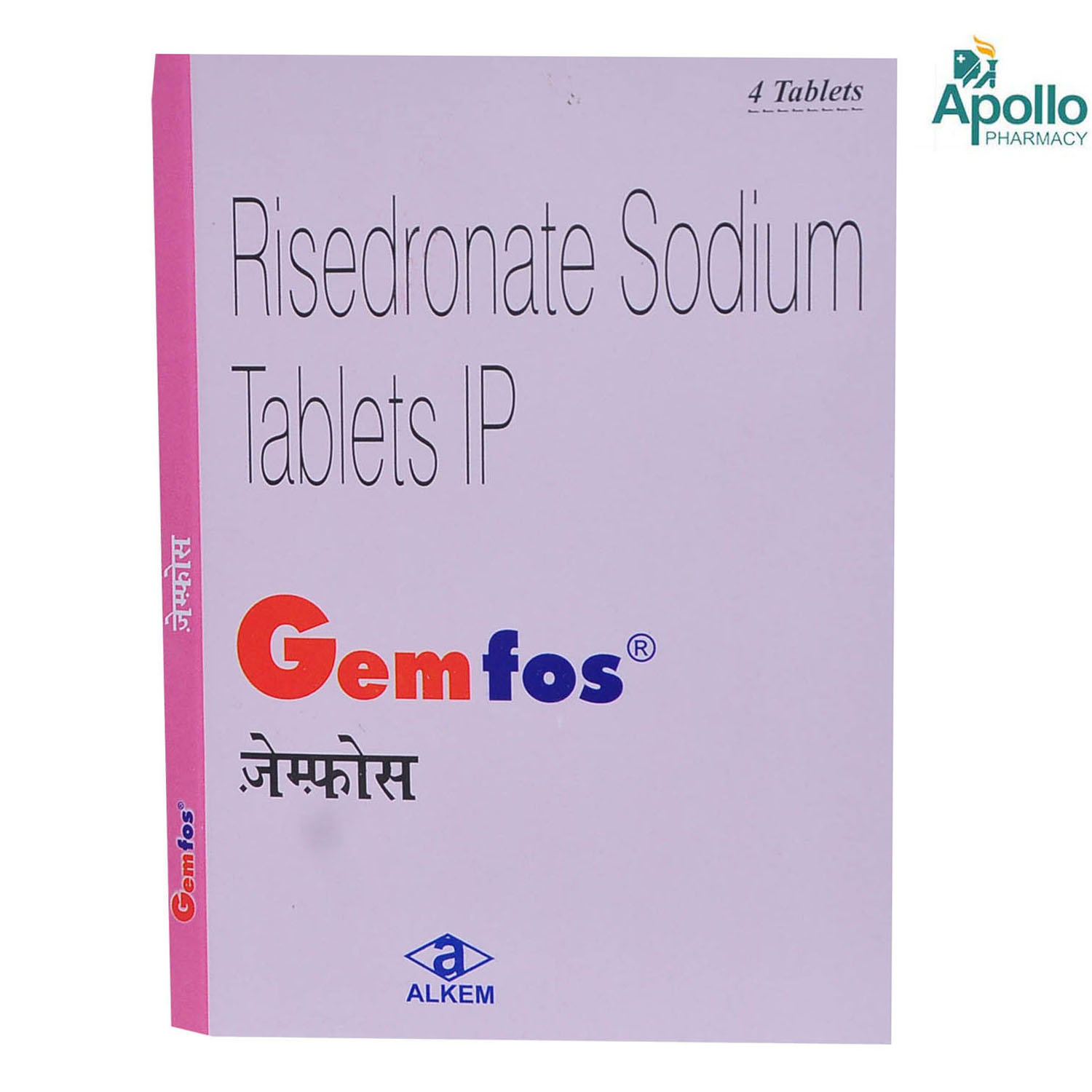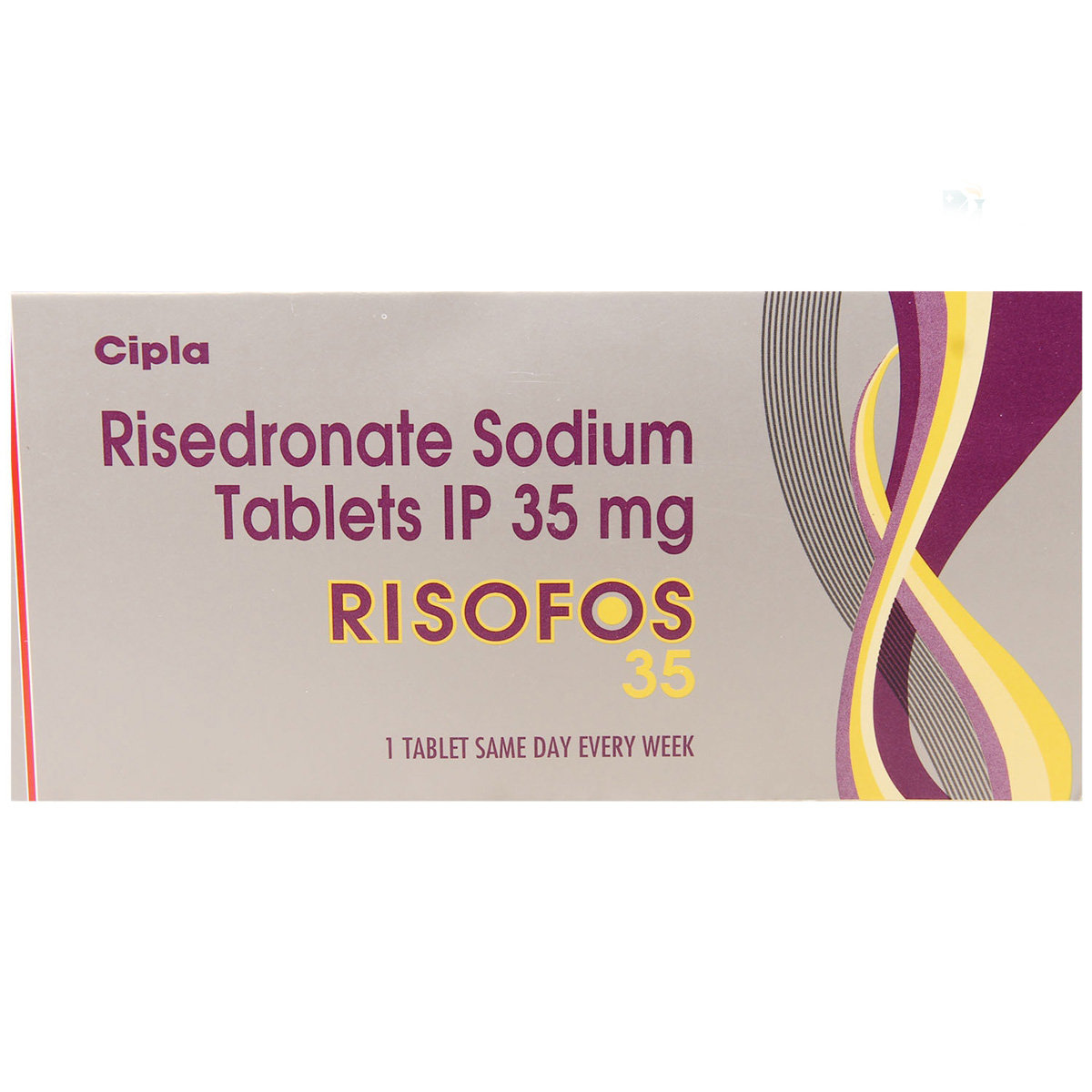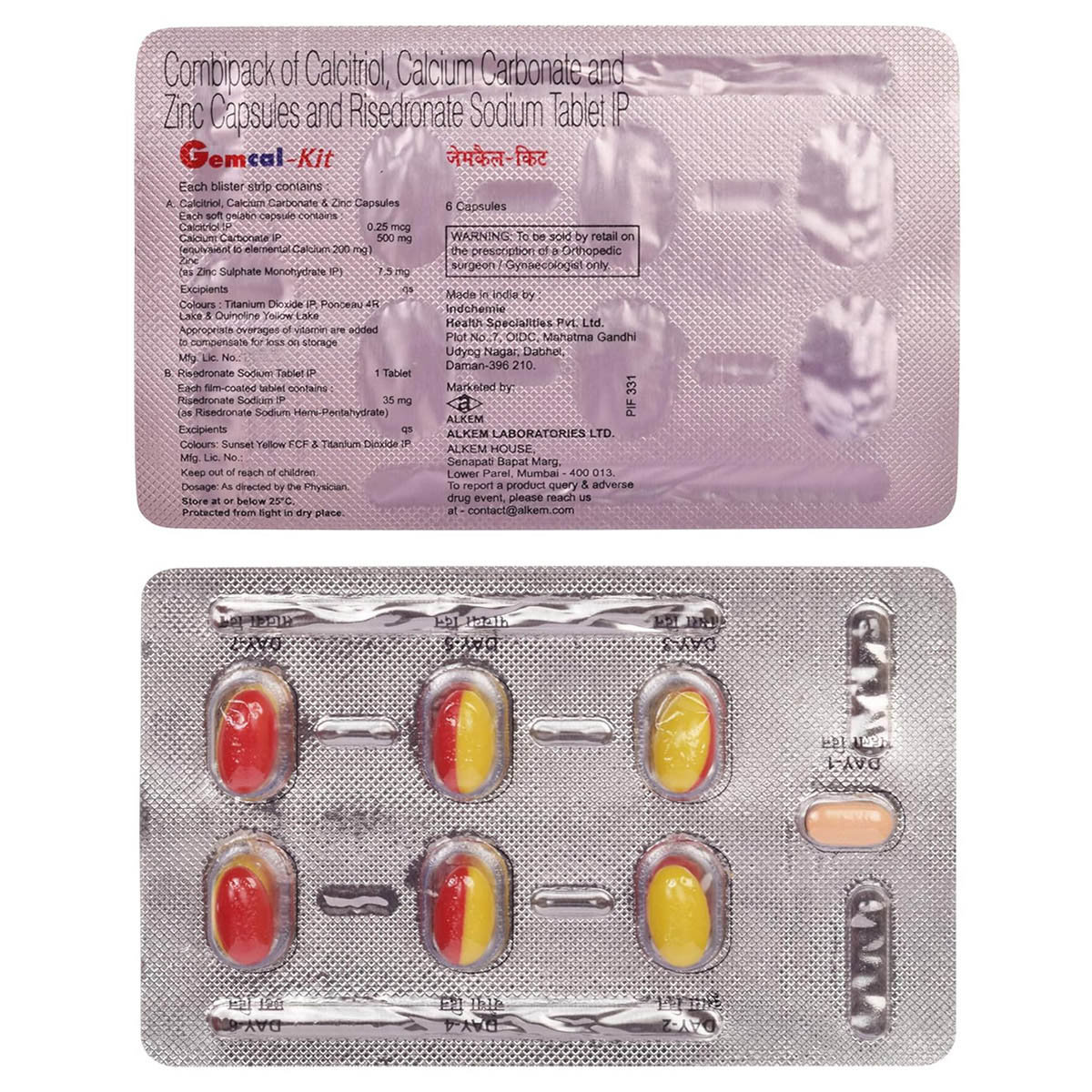Risedronate Sodium
About Risedronate Sodium
Risedronate Sodium belongs to a group of non-hormonal medicines called bisphosphonates, used to treat bone diseases such as osteoporosis (weak and brittle bones) and Paget's disease of bone (soft and weak bones).
Risedronate Sodium contains Risedronate sodium, which works by preventing bone breakdown and increasing bone density. Thereby, it makes the bones strong and less likely to break.
Risedronate Sodium may cause side effects like nausea, indigestion, stomach pain/discomfort, headache, diarrhoea and constipation. Most of these side effects do not require medical attention and gradually resolve over time. However, if the side effects persist or worsen, consult your doctor.
Do not take Risedronate Sodium if you are allergic to any of its components. Consult your doctor if you are pregnant or breastfeeding. Keep your doctor informed about your health condition and medications to prevent any interactions.
Uses of Risedronate Sodium
Medicinal Benefits
- Risedronate Sodium helps maintain and increase bone density by slowing down bone breakdown.
- It strengthens bones and reduces the risk of fractures in patients with osteoporosis.
- It is useful in the prevention and treatment of postmenopausal osteoporosis.
- Risedronate Sodium helps increase bone mass in men with osteoporosis.
- Prevents and treats glucocorticoid-induced osteoporosis (bone loss caused by long-term steroid use).
- Risedronate Sodium also treats Paget’s disease of bone by reducing abnormal bone turnover.
- It helps relieve bone pain and reduces bone deformities associated with Paget’s disease.
- It improves overall bone strength and skeletal health.
Directions for Use
- Risedronate Sodium should be taken on an empty stomach at least 30 minutes before breakfast, or as advised by the doctor.
- Follow your doctor's instructions regarding the dosage and duration.
- Swallow Risedronate Sodium as a whole with a glass of water.
- Do not chew, crush, or break it.
- Stay sitting or standing for at least 30 minutes after taking Risedronate Sodium. Do not lie down during this time.
Storage
Side Effects of Risedronate Sodium
- Nausea
- Indigestion
- Stomach pain/discomfort
- Headache
- Diarrhoea
- Constipation
- Bloating
- Feeling of fullness
- Muscle, joint or bone pain
Drug Warnings
- Do not take Risedronate Sodium if you are allergic to any of its components, if you are unable to sit or stand for at least 30 minutes or have severe kidney problems.
- Inform your doctor if you have abnormal bone/mineral metabolism, problems with the oesophagus, or are undergoing any dental procedure.
- Consult your doctor if you are pregnant or breastfeeding.
- Risedronate Sodium is not recommended for children as safety has not been established.
- Risedronate Sodium can cause serious problems in the stomach or oesophagus. Stop using this medicine and call your doctor at once if you have chest pain, new or worsening heartburn, or pain when swallowing.
- Talk to your doctor if you experience jaw problems, eye inflammation, or pain in the joints, bones or muscles.
- Let your doctor know if you are taking any other medicines.
Drug Interactions
Drug-Drug interactions: Inform your doctor if you are taking calcium or antacids.
Drug-Food interactions: Foods like mineral water, coffee, tea, or juice may decrease the absorption of Risedronate Sodium.
Drug-Disease interactions: Risedronate Sodium is not recommended in people with hypocalcemia (low blood calcium levels).
Drug-Drug Interactions Checker List:
Safety Advice

Alcohol
unsafeA person should limit the consumption of alcohol as it can increase the risk of stomach side effects from Risedronate Sodium.

Pregnancy
cautionRisedronate Sodium should be used during pregnancy only if prescribed by the doctor. Please consult the doctor if you are pregnant, planning for pregnancy or think you may be pregnant.

Breast Feeding
unsafeRisedronate Sodium may pass in breast milk and harm the nursing baby, so do not take Risedronate Sodium while breastfeeding.

Driving
safe if prescribedRisedronate Sodium does not influence a person's ability to drive.

Liver
consult your doctorPlease consult your doctor if you have liver impairment or any concerns regarding this.

Kidney
cautionRisedronate Sodium is not recommended for patients with severe kidney impairment. Consult your doctor if you have kidney disorders.

Children
unsafeRisedronate Sodium should not be given to children or adolescents whose age is less than 18 years.
Habit Forming
Diet & Lifestyle Advise
- A person should consume calcium and vitamin D in their diet as it helps make stronger bones and avoid everyday osteoporosis dangers.
- A post-menopausal woman should limit salt intake, as it can pose a high risk of losing more bone minerals than other women of the same age.
- Do regular exercise like weight-bearing exercises, which are important for maintaining bone health.
Special Advise
- Risedronate Sodium may interfere with bone-imaging agents. Hence, if you are due to undergo any tests, inform your doctor.
- Do not eat or drink anything except water before you take Risedronate Sodium and for at least 30 minutes after you take it.
- Avoid lying down for at least 30 minutes after you take Risedronate Sodium.
Patients Concern
Disease/Condition Glossary
Osteoporosis: It is a condition that causes thinning and weakening of the bones. It usually happens in women after menopause. When a woman reaches her menopause stage, her ovaries stop making estrogen, a female hormone responsible for keeping a woman’s skeleton healthy. Due to a lack of estrogen, the bone begins to weaken and undergoes bone loss. The earlier a woman reaches the menopause stage, the greater the chances of osteoporosis. In the starting days, osteoporosis does not show any symptoms. However, if proper treatment is not provided, then it can even lead to broken bones. Initially, the bones don't hurt, and breaks in the spine's bones may go unseen until they cause height loss. In osteoporosis, bones can break even during daily activities like lifting or even during minor activities. Bones usually occur at the hip, spine, or wrist, which can even lead to stooped posture (‘dowager’s hump’) and loss of movement.
FAQs
Risedronate Sodium is used to treat postmenopausal osteoporosis, glucocorticoid-induced osteoporosis, osteoporosis in men and Paget's disease of bone.
Risedronate Sodium contains Risedronate sodium, which works by preventing bone breakdown and increasing bone density. Thereby, it makes the bones strong and less likely to break.
People who are allergic to any of its components, are unable to sit or stand for at least 30 minutes, or have low calcium levels should not take Risedronate Sodium.
Risedronate Sodium may increase the risk of jawbone problems (osteonecrosis), especially in persons with pre-existing dental problems, or people treated with steroids, cancer, blood cell disorders, chemotherapy, or radiation.
It is advised not to breastfeed while taking Risedronate Sodium as this medicine can pass into breastmilk. Consult with your doctor about any risk.
A person should take extra care of their dental hygiene while taking Risedronate Sodium, and if they are going for any dental work (especially surgery), they should tell the dentist ahead of time that they are taking this medicine.
Persons aged above 35 years, have low estrogen levels, females reaching menopause, consume too much alcohol, tobacco, or caffeine, and lack calcium and vitamin D, are at an increased risk of osteoporosis.
Risedronate Sodium is a part of a complete program that includes modifications in diet, regular exercise, bone mineral density testing, and intake of calcium and vitamin supplements. Follow the doctor's guidelines very closely.
Foods, medicines and vitamin supplements may affect the absorption of Risedronate Sodium. Therefore, to maintain the effectiveness of Risedronate Sodium, it should be taken with plain water only.
Risedronate Sodium may cause diarrhoea as a side effect. Drink enough fluids and eat non-spicy food if you experience diarrhoea. Consult the doctor if the diarrhoea persists or worsens.
Take Risedronate Sodium without food on an empty stomach with one glass of water at least half an hour before breakfast, and remain in a sitting or standing position for about 30 minutes. Do not crush, chew, or break it.
Lying down after taking Risedronate Sodium may cause the medication to return to the oesophagus. Therefore, do not lie down for at least 30 minutes after you take Risedronate Sodium. Sit or stand upright for at least 30 minutes after taking Risedronate Sodium.
Risedronate Sodium may cause hair loss in some people. Consult the doctor if you notice hair loss or thinning of hair during treatment with Risedronate Sodium.
Risedronate Sodium should be used during pregnancy only if prescribed by the doctor. Please consult the doctor if you are pregnant, planning for pregnancy or think you may be pregnant.
Keep your teeth clean and have a dental check-up every 6 months, as Risedronate Sodium may affect your jawbone.
Risedronate Sodium may cause side effects like nausea, indigestion, stomach pain/discomfort, headache, diarrhoea and constipation. Most of these side effects do not require medical attention and gradually resolve over time. However, if the side effects persist or worsen, consult your doctor.






